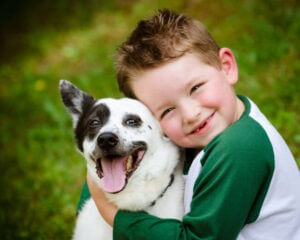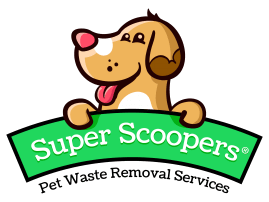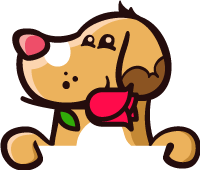Why Scoop Dog Poop?
 Let’s face it… dog poop is a fact of owning a pet. You worked hard to make sure your dog does its business outside. You would not want your dog to go in your house, but your yard is an extension of your living space.
Let’s face it… dog poop is a fact of owning a pet. You worked hard to make sure your dog does its business outside. You would not want your dog to go in your house, but your yard is an extension of your living space.
Dog poop not only smells bad, but it can create a mess when stepped in or run over by a lawn mower. It can also be a health concern.
When dog poop is on your lawn, eggs of certain roundworms and other parasites can still be active.
Kids play, adults garden, babies walk barefoot in the grass. That means that they may come in contact with those eggs which can be transferred to them as well.
Why should you scoop?
Let's talk about your needs... We will call you!
First Visit FREE When You Sign Up For Weekly Services!

Happy Valentine's Day!
Sign up for weekly services and receive $20.00 OFF your first month of service!*
Coupon Code: SS20
[wpdevart_countdown text_for_day="Days" text_for_hour="Hours" text_for_minut="Minutes" text_for_second="Seconds" countdown_end_type="time" end_date="15-01-2020 23:59" start_time="1579091213" end_time="30,17,32" action_end_time="hide" content_position="center" top_ditance="10" bottom_distance="10" countdown_type="vertical_slide" font_color="#000000" button_bg_color="#3DA8CC" circle_size="130" circle_border="5" border_radius="8" font_size="68" countdown_font_famaly="monospace" animation_type="none" ][/wpdevart_countdown]
* Only for new customers who have never used Super Scoopers before *Credit does not apply for one-time cleanings or temporary service
*Cannot be combined with other offers *Offer Expires:
Pets and Kids

Playing with your dog in the backyard seems harmless, until Rover takes a moment to do his business, and it is left in the same area where the family is playing. Simply “leaving it alone” isn’t enough.
When infected dog poop is deposited on your lawn, eggs of certain roundworms and other parasites infiltrate the soil. When kids play, adults garden, or baby walks barefoot on that same grass, and come in contact with leftover poop, those eggs can be transferred to them as well.
Even if the stool is not fresh, one small step could hold a variety of diseases including hookworms, ringworms and tapeworms. In humans, these infections cause fever, muscle aches, headache, vomiting, and diarrhea, and children are most susceptible.
Environmental Concerns
A single gram of dog waste can contain 23 million bacteria. Over time, this waste is absorbed by the soil and filtered into the waterways. The natural eco-system can handle the bacteria produced by two dogs per square mile. However, in most areas there are over 100 dogs per square mile. While there are wastewater filtration systems in most areas, they are not designed to handle the bacteria in feces. Thus, dog waste in water causes several problems.
- First, animal waste is among the top contributors of bacterial pollution in urban watersheds. When dog waste is left on your lawn, roundworms, hookworms, and bacteria can live in the soil for long periods of time. These diseases and bacteria can be easily transmitted to humans and other animals, and cause serious problems such as Giardia, Salmonella, and E. coli.
- Second, when dog waste is carried into a water stream, it adds a significant amount of nitrogen to the water. This nitrogen depletes the oxygen necessary for grasses, wildlife, and fish.
- Third, when rain falls and snow melts over dog waste, the poop is mixed in with storm water runoff, and flows downstream across yards, parks, trails, etc. on its way to the storm drains. This leads to serious water quality issues, which lead to contamination of beaches, lakes, streams, fish, seafood and drinking water.
In 1991, dog waste was officially labeled as a non-point source pollutant by the Environmental Protection Agency (EPA). This puts dog poop in the same category as herbicides, insecticides, oil grease, acid drainage, and toxic chemicals.
Protect Your Lawn

Without proper scooping and pet waste disposal, the damage to your lawn may be irreparable. This can cause big problems if you try to install new landscaping, or if you may sell your home in the future.
Nearly half of dog owners in the United States admit to not picking up after their own pet. This adds up to big problems that extend well beyond your property line.
While it is unlikely that the poop police will show up to inspect your backyard, many urban and suburban areas have enacted laws that require pet owners to clean up after their pets. Refusing to clean up after your pet can show poor judgment and failure to provide a safe place for children.
There are no federal laws requiring dog owners to pick up after their pets, but you may see signs posted requiring dog owners to pickup after their pets and/or a phone number to call to report those who don’t.
Common Courtesy
In addition to health concerns for the environment and your family, poop scooping carries some common sense benefits. Anyone who has had the misfortune of stepping in dog poop can understand the practical reasons for cleaning up. One poop-covered shoe can ruin a perfectly good day.
Cleanliness
If you have dogs with free reign of your yard, that same yard becomes less usable for family barbeques, birthday parties, outdoor games, and gardening. The same is true for public areas: if left alone, the overrun of feces limits the ability of others to enjoy the area. Dirty lawns and parks attract unpleasant odors, flies, and other pests.
If you’re a parent, you change diapers. If you’re a pet owner, you scoop poop. Cleaning up after your pets is simply one of the conditions of dog ownership. Scooping is part of the responsibilities of caring for your dog as well as the proper disposal of their waste. It is not just about being polite, it is crucial for the health of your dog, your children, your neighborhood, and other animals in the area.
The average dog produces approximately 3/4 pounds of poop every day. To keep our families healthy and our shoes clean, we recommend scooping at least once a week for one to two dogs. If you have more than two dogs it is recommended to poop scoop at least every other day, or twice weekly.




